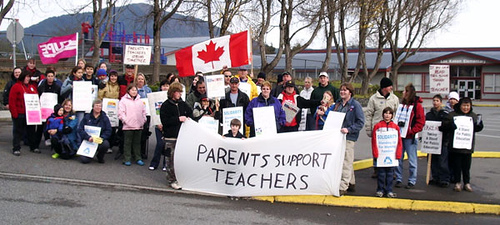Message from Elliott Burnell, President, UBC Faculty Association
I am pleased to inform you that, with the help of mediator Mark Brown of the Labour Relations Board, the Faculty Association has today reached a four-year settlement with the UBC Administration. This agreement includes the “signing bonus”, wage increases in each year and language improvements -details will be sent to all members early next week, and an information meeting will follow the AGM Thursday April 6, 2006. Ratification of the agreement will be by electronic ballot – we will inform you of details next week.
Best regards on behalf of the Faculty Association Bargaining Team and the
Executive.
The tentative agreement for the period July 1, 2006 – June 30, 2010 provides for a monetary package totaling 13% over the four years of the Agreement, out of which are costed $3.2 million in retention funds, $600,000 for a subsidiary agreement with the Sauder School of Business, and $268,000 in other targeted increases – $50,000 to be applied to the Librarians’ minimum scale, and $218,000 to be spent in Nursing across both campuses.
Following the deductions noted above, the monetary package includes general wage increases and market adjustments for all members in each year and a flat-rate increase ($962 per FTE in year one) designed to provide additional benefit to those with lower salaries. The agreement also provides for a signing bonus totaling $10.95 million ($3,255 per member) less statutory benefits, to be divided among members of the bargaining unit.
In addition to the monetary terms, the agreement provides for a number of changes to the Agreement on the Framework for Collective Bargaining, including:
- re-writing articles throughout to reference all members of the bargaining unit, including Librarians and Program Directors;
- substantial expansion of the definition of academic freedom to reflect that contained in University policy;
provision for a joint consultation committee to address issues of mutual concern on an ongoing basis; - explicit recognition of the right to be consulted on matters of workload;
- improved access of the Association to information held by the University
Leave of Absence provisions have been amended to increase clarity, and to ensure that members on medical, maternity or parental leave do not face excessive delays in eligibility for study leave. As of this July 1, 2006, up to six months of each medical, maternity or parental leave can be counted as full-time service toward sabbatical.
Finally, the tentative agreement creates a process whereby significant issues that could not be fully resolved by the March 31st deadline will continue to be discussed. Under this process, negotiations regarding the abolition of mandatory retirement will continue, with agreement to involve an external facilitator if the issue remains unresolved after 31 December, 2006.
 On November 9th, 2005 UBC faculty members, parent organization representatives, teachers, and community leaders met to discuss the significance of BC’s longest lasting province-wide teachers strike. Presentations from Catherine Evans (BCSPE), Jinny Sims (Pres. BCTF), Paul Orlowski (Van. Teacher), Kevin Milsep (former VSB trustee), and UBC faculty members Charles Menzies, Stephen Petrina, and E. Wayne Ross discussed a range of issues related to the strike.
On November 9th, 2005 UBC faculty members, parent organization representatives, teachers, and community leaders met to discuss the significance of BC’s longest lasting province-wide teachers strike. Presentations from Catherine Evans (BCSPE), Jinny Sims (Pres. BCTF), Paul Orlowski (Van. Teacher), Kevin Milsep (former VSB trustee), and UBC faculty members Charles Menzies, Stephen Petrina, and E. Wayne Ross discussed a range of issues related to the strike.